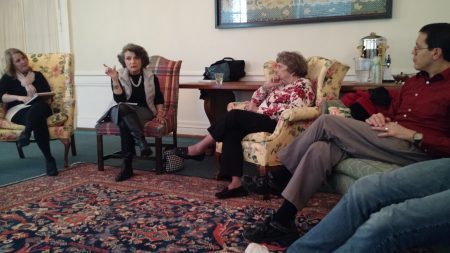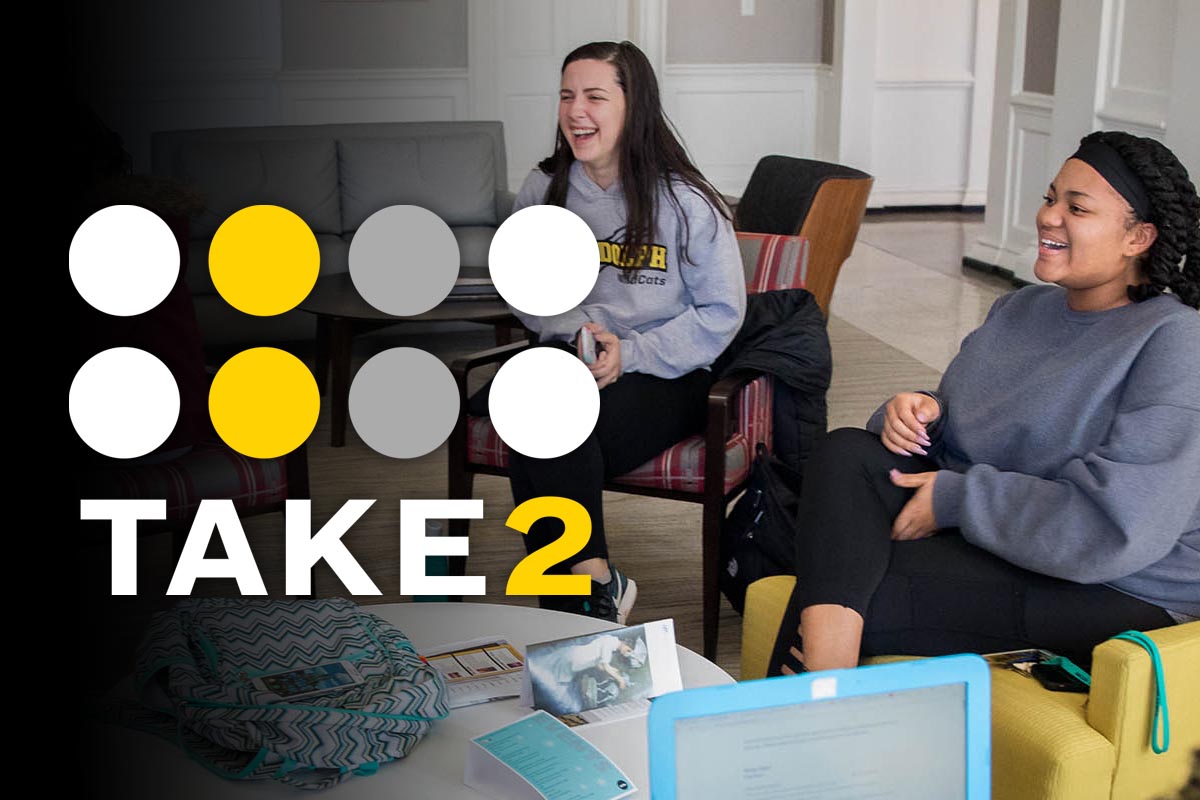Community leaders inspire Randolph students to be agents of change

Lynchburg City Councilwoman Joan Foster speaks about the importance of education in improving communities. Laura Hamilton, executive director for Beacon of Hope (left) also spoke about education and ways Randolph students can make a difference in Lynchburg.
Lynchburg City Councilwoman Joan Foster challenged Randolph students to be part of change and to “pay it forward” as a speaker for the College’s “Voices of Lynchburg” series Wednesday evening.
Joining Foster for the presentation, “Lynchburg’s Hope,” was Laura Hamilton, executive director for the local non-profit, Beacon of Hope. The two community leaders discussed the correlation between poverty and quality of education, as well as the importance of education in breaking social barriers. They also described Beacon of Hope’s role in enhancing educational opportunities for local students.
In addition to offering scholarships, Beacon of Hope reaches out to Lynchburg City School students through Future Centers, which are housed in both of the city’s high schools and provide resources and guidance for all students wanting to attend college. The organization also sponsors programs in elementary and middle schools to show younger students how and why they should consider a post-secondary education. A mentorship program is offered as well, allowing college students to serve as mentors.
Since the inception of Future Centers, the rate of college-bound high school students in the city has increased by 20 percent, according to Hamilton.
“The most important thing was to change the culture in our schools and create an expectation for our kids, all the way down to pre-K, that they were going to go on to college,” Hamilton said. “We let them know that nobody could do or say anything to stop them and we would support them all the way through.”
Foster added that the program supports students pursuing careers in trades and is helping the city train its future workforce. She also hopes to see a drop in the poverty rate, which currently stands at 24.6 percent.
“We’re seeing a change in our culture—we’re calling it cradle to career culture,” she said. “A lot of our young people who felt they couldn’t go to college now feel like they can, and they have a career plan.”
Maureen Edu ’17 felt a Future Center would have been beneficial at her high school in Maryland. “Since my family is from Ghana originally, we didn’t understand the whole U.S. college system, so it was a struggle for me to understand how the application process worked, SAT’s, and what you have to do for FAFSA,” she said.
Drucilla Williams ’18 said she saw value in the mentorship aspect of the program. “I think it’s especially important for a child to see someone who comes from a similar background become successful,” she said. “It gives them hope to push forward.”
Hamilton encouraged any students interested in serving as mentors for the program to visit the Beacon of Hope website, http://beaconofhopelynchburg.org/.
This event was the second in the “Voices of Lynchburg” speaker series at Randolph College. The program is a collaboration between the Randolph College multicultural services office and the Life More Abundant community-based learning program.
Michael Maningas, assistant dean of students, started the speaker series this year to build awareness of issues regarding social justice and poverty in the Lynchburg community.
“By engaging in dialogue with local government officials, community non-profit partners, community members and Randolph affiliates, we challenge our students to think creatively and explore innovative solutions as agents of change,” Maningas said. “These events help students to realize that they, too, can make a difference whether here in Lynchburg or in the greater global communities they reside after Randolph.”
The third speaker this semester is Mark Sheehan, executive director of the Lynchburg Boys and Girls Club, who will speak April 13 at 5:30 p.m. in the Ribble Lounge of Smith Hall. The events are free and open to the public.
For more information on “Voices of Lynchburg” or Randolph’s community service programs, contact Maningas at mmaningas@randolphcollege.edu.
Tags: community, community service, education, events, speakers, Voices of Lynchburg
